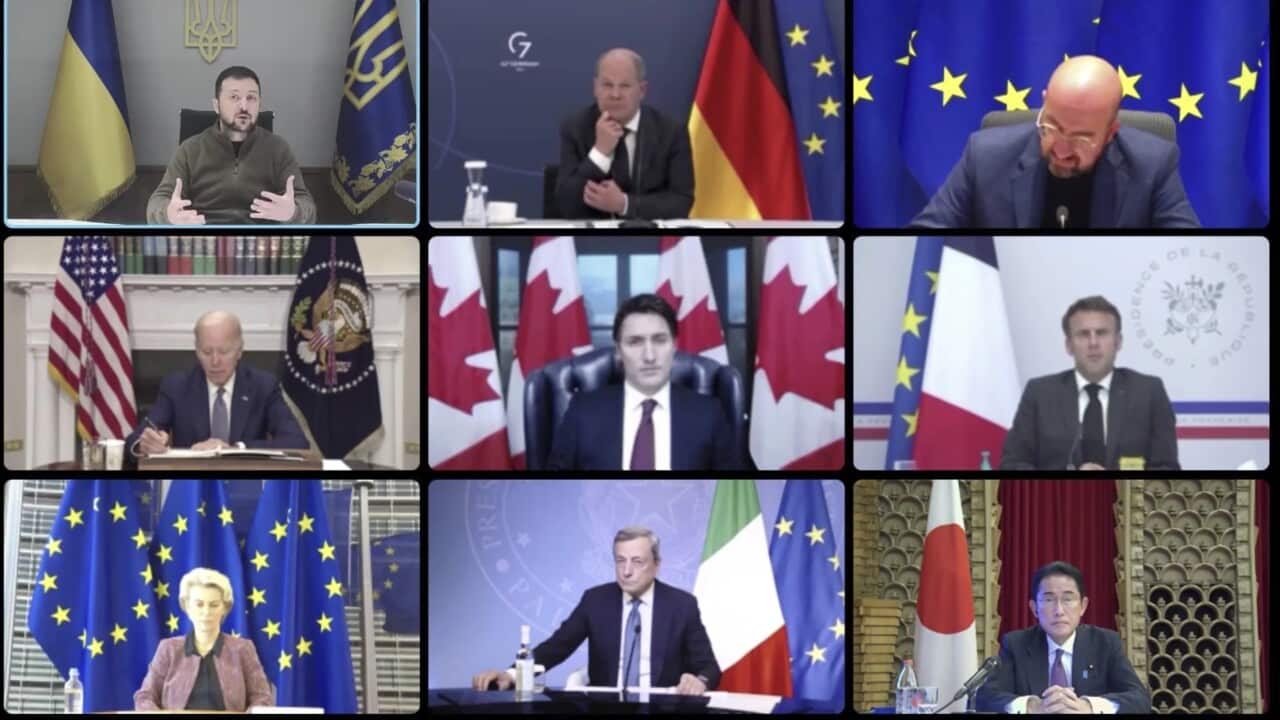Key Points
- The Russian-installed governor of Ukraine's southern Kherson region proposed residents take their children and leave for safety.
- It is a stark sign that Moscow is losing its grip on territory it claims to have annexed.
Russia says it will help residents leave the Moscow-occupied Ukrainian region of Kherson after Kremlin-backed authorities there asked for aid following a Ukrainian counteroffensive.
"The government took the decision to organise assistance for the departure of residents of the (Kherson) region to other regions of the country," Russian Deputy Prime Minister Marat Khusnullin said on state television.
"We will provide everyone with free accommodation and everything necessary," he said.
"As such, the leadership of Kherson administration has decided to provide Kherson families with the option to travel to other regions of the Russian Federation to rest and study," he said.
"We suggested that all residents of the Kherson region, if they wish, to protect themselves from the consequences of missile strikes, ... go to other regions," he said.
Earlier on Thursday, the Moscow-installed head of Kherson -- which the Kremlin says it has annexed -- asked Russia to help with evacuations, in a sign that Kyiv's counteroffensive is advancing.
"We suggested to all people of the Kherson region to, if they wish, leave to other regions to protect themselves from missile hits," Vladimir Saldo said on Telegram.
"In addressing the leadership of the country (Russia), I ask you to help organise this work."
He added: "We, the people of the Kherson region, know that Russia does not abandon its own."
Mr Saldo said the region was being hit by an increasing amount of rockets causing "serious damage". He said civilian infrastructure was being targeted.
He said those leaving would go to Crimea, a peninsula that Moscow annexed from Ukraine in 2014, and southern Russian regions.
The call came a day after Kyiv said it had retaken five settlements in Kherson.
Last week Ukraine, which announced its counteroffensive in the south in August, said it had recaptured over 400 square kilometres in Kherson in less than a week.
Kherson is one of the four regions in Ukraine that Moscow recently claimed to have annexed.
The city of Kherson, which lies near Crimea, was the first major Ukrainian city to fall to Russian forces after the Kremlin launched its attack on February 24.
Deputy denies evacuation
Moments after Mr Saldo's message, Mr Saldo's deputy, Kirill Stremousov, issued a statement denying any plan to evacuate.
"There is and can be no evacuation in Kherson region," Mr Stremousov said, adding in a written comment: "Nobody is planning to withdraw Russian troops from the Kherson region."
A flight of civilians from Kherson would be a major blow to Russia's claim to have annexed around 15 per cent of Ukraine's territory and incorporated an area the size of Portugal into Russia.

Destroyed Russian military equipment placed at the recaptured town of Lyman. As part of a rapid Ukrainian counteroffensive which recaptured swaths of the Donetsk, Kharkiv and Kherson regions from Russian control, Lyman was liberated too. Credit: SOPA Images/Sipa USA
In the past two weeks, Ukraine has recaptured a swath of territory, with its forces bearing down towards the 3 km-long Nova Kakhovka dam that provides one of the last river crossings.
Mykolaiv, the nearest big Ukrainian-held city to Kherson, came under massive Russian bombardment on Thursday, with civilian facilities hit, local officials said.
Regional governor Vitaly Kim said the top two floors of a five-story residential building were destroyed and the rest were under the rubble. Video footage provided by state emergency services showed rescuers pulling out an 11-year-old boy who Kim said had spent six hours trapped under the rubble.
In the east, three Russian missiles exploded on Thursday morning near the central market in Kupiansk, a major railway junction city that Ukrainian forces recaptured during their big advance there in September.
The missiles destroyed shops, carpeting surrounding streets with glass shards, rubble, and twisted metal sheets.
Dmytro, who declined to give his last name, trudged up the debris-strewn steps of his shoe store to salvage whatever undamaged inventory he could from the devastated interior.
"Who knows? They consider it a military object," he said sarcastically when asked why he thought the Russians hit Kupiansk's commercial centre.
Ukraine's gains in the south this month followed rapid gains in the east since September.
'Dangerous times'
Russian President Vladimir Putin has responded to the battlefield setbacks with dramatic moves to escalate the conflict: proclaiming the annexation of territory, calling up hundreds of thousands of reservists and repeatedly threatening to use nuclear weapons to protect Russia.
This week, Mr Putin launched the biggest air strikes since the start of the war, firing more than 100 cruise missiles mainly at electricity and heat infrastructure, with some landing in parks, busy roads and at tourist sites.
Mr Putin said the strikes were retaliation for a blast on Saturday that damaged Russia's bridge to Crimea.
Although the nationwide air strikes have tapered since Tuesday, Russian forces have continued to strike towns and cities closer to the front.
On Thursday NATO allies meeting in Brussels unveiled plans to also jointly beef up Europe's air defences with Patriot and other missile systems.
"We are living in threatening, dangerous times," said German Defence Minister Christine Lambrecht at a signing ceremony where Germany and more than a dozen European NATO members committed to jointly procuring weapons for a "European Sky Shield".
Moscow said more military aid for Kyiv made members of the U.S.-led military alliance "a direct party to the conflict" and said admitting Ukraine to NATO would trigger a global conflict.
Ukrainian President Volodymyr Zelenskyy told the Parliamentary Assembly of the Council of Europe on Thursday that Ukraine still had about only 10 per cent of what it needed to protect itself against Russian air attacks.










